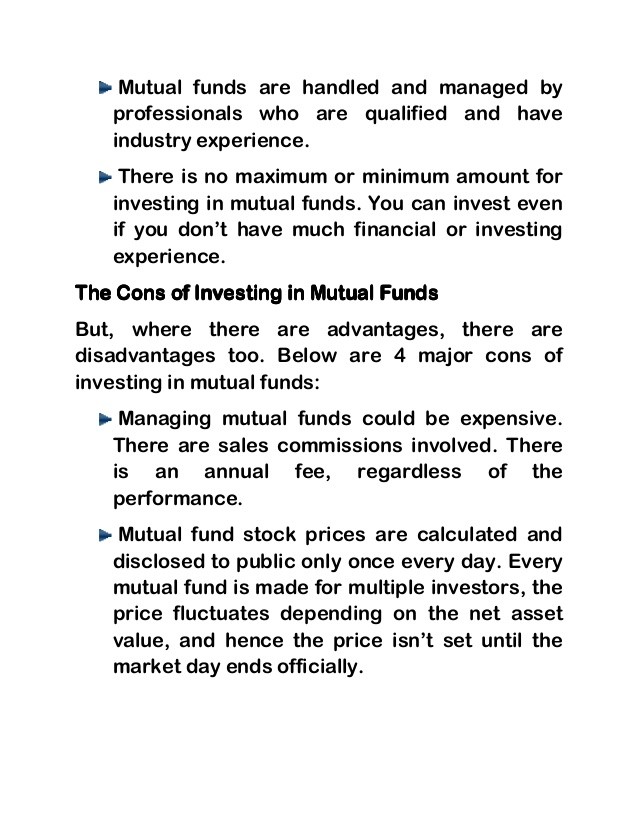The pros and cons of investing in mutual funds
Post on: 25 Август, 2015 No Comment

Everyone’s heard of mutual funds. They’re companies that pool money from many individual and institutional investors to buy and sell a variety of securities and assets, such as stocks, bonds, money markets, real estate, and precious metals. A mutual fund’s holdings are called its portfolio and each investor owns shares, which are a portion of the portfolio. When you buy or sell most mutual fund shares, you do it directly with the fund family. A few of the best-known mutual fund families are Fidelity. Schwab. and Vanguard .
The Pros of Investing in Mutual Funds
When you own shares of a mutual fund, the benefit is that you have a convenient, well-diversified package of many individual investments that would be complicated for the typical investor to manage on their own. Mutual funds are professionally managed and give you the ability to invest small or large amounts of money, even if you don’t have much financial or investing experience.
The Cons of Investing in Mutual Funds
The pros sound great, but there are some important cons of investing in mutual funds to keep in mind:
- Most charge fees. Mutual funds can be expensive to operate. That’s why investors get hit with annual fees and sales commissions regardless of a fund’s performance. However, there are some no-load funds that can minimize management fees.
- Share prices are calculated just once a day. A mutual fund is different from a stock where you can monitor price changes minute by minute, if you like, by checking Web sites like etrade.com or scottrade.com. Since a mutual fund is made up of multiple securities, its price depends on the fund’s net asset value or NAV which is calculated at the end of the trading day. When you put in an order to buy or sell mutual funds, the price is unknown until the financial markets close.
- Capital gains of the fund get passed along to shareholders. U.S. tax law requires mutual funds to distribute capital gains to their shareholders. These distributions are taxed at the long-term capital gain rate, no matter how long you’ve owned the shares.
Capital Gains and Mutual Funds
One the biggest cons of owning a mutual fund is something called a phantom gain. A phantom gain gets its name from the fact that you can lose money on an investment, but still owe taxes—which is a real bummer! Phantom gains are common in a down market and can occur when investors decide to sell a declining mutual fund. When investors sell their mutual fund shares, the fund company might need to raise cash in order to pay them. In some cases, the fund might have to sell some of their investments—even profitable ones. Selling profitable investments creates a capital gain, which is taxable and unfortunately gets passed along to the fund investors.
The way capital gains work with mutual funds is very different than with an individual security, such as a stock. When you own a stock, you pay tax each year on any earnings you may receive, such as a dividend. But you don’t pay capital gains tax until you actually sell the stock and bank a profit. With mutual funds, this same information is true. But in addition to paying capital gains tax on shares you sell and profit from, you also have to pay taxes each year on the fund’s capital gains.
How to Defer or Eliminate Mutual Fund Taxes
One way to defer taxes on mutual fund distributions is to own the fund inside of a retirement account, such as a traditional IRA or 401(k). These accounts enjoy tax-deferred growth, which means your profits within them aren’t reported as capital gains. You don’t get hit with any taxes until you make a distribution from a traditional retirement account after the age of 59½. At that time your profits are taxed as ordinary income, not as capital gains.
Another option is to own mutual funds inside of a Roth IRA or Roth 401(k). which are tax-free retirement vehicles. You pay taxes upfront on money you put in a Roth account, but the growth is completely tax-free. That means you could use a Roth account to completely eliminate taxes on mutual fund distributions.
If you own mutual funds outside of a retirement account, be prepared for any possible tax liability this year. Many mutual funds end their fiscal year at the end of October, so be on the look-out for their distribution estimates so you can plan accordingly. See IRS Publication 564 for in-depth information about the taxes associated with investing in mutual funds.
Thats some great information. If investing in mutual funds is not the way to go then I dont know what is.I have my mutual funds in my Roth IRA. It seems there are more Pros than cons to owning mutual funds. I enjoy the Money Girl Podcasts.
@50plusfinance Thanks for the kind words! Over time, Ive been selling mutual funds that I own in IRAs and taxable brokerage accounts and replacing them with exchange traded funds (ETFs). ETF fees are literally a fraction of what mutual funds charge. Plus, you dont have the other two problems I mentioned: phantom gains and once-a-day valuations. ETFs are traded on exchanges just like stocks, so you can track their prices by the minute. And theyre taxed like stocks with no capital gains until you bank a profit. Take a look at ishares.com or proshares.com to learn more about ETFs.

3A%2F%2F1.gravatar.com%2Favatar%2Fad516503a11cd5ca435acc9bb6523536%3Fs%3D44&r=R /% 3 Will September 24, 2010 at 5:10 pm
Your article is well-written and researched. I would suggest that you are correct to pursue ETFs, especially if you have a broker like Vanguard that allows you to buy and sell them for even less than the already fractional cost at most places. Even the fees of unmanaged mutual funds are higher, and it has been my experience that many funds require a minimum investment of several thousand dollars. ETFs can be bought in individual shares, making them accessible to the average Joe that doesnt have the 20-30k necessary to create a diversified portfolio at 2-3k a pop.
Thank you for the great post.
Laura,
I think the capital gains disbursements of a mutual fund are one of their biggest Pros, not a Con.
First, unlike CDs, savings accounts or other interst-based investments, your mutual fund grows in three ways, dividends, capital gains and appreciation. Some years, this helps a lot.
Second, you are taxed on capital gains at the low long-term rate of 15%, which is great for people in higher income tax brackets, which can reach 39%.
Third, if you reinvest your dividends and capital gains, you accumulate addidtional fund shares at the lower adjusted rate. For example, if you own 100 shares of a fund with a $10 NAV and you get a $1 disbursement, you would get close to 111 shares at a $9 NAV. Even though the principal remains the same, more shares is a good thing. Its like a mini stock split.
I look forward to receiving my distriutions every December and the tax liability is minimal. Often, what happens is the share price quickly returns to the pre-disbursement level and you have more shares. December is usually a great month.
@Bret The annual returns on mutual funds are reduced by the taxes on dividends and capital gains distributions. Additionally, active trading by mutual fund managers racks up transaction costs, which get passed along to investors in fees. After-tax returns are lower for funds with high turnover rates than for those with low turnover. To maximize returns, my recommendation is to choose mutual funds with very low turnover (like index funds) or to own them inside of a retirement account. Another option is to abandon mutual funds altogether and to choose exchange-traded funds, which have none of the capital gains issues and very inexpensive fees.
Laura,
Im not opposed to index funds. But, like I said in my series on picking mutual funds, I have been able to consistently beat the indexes. And, I would much rather have the dividends and capitals gains and pay taxes on them. I guess everyone has their own M.O.
My portfolio consists of mutual funds, stocks, ETFS in deferred and brokerage accounts. I find that a mix of investments reduce the tax bit and exposure to various types of investments.
If you own mutual funds outside of a retirement account, be prepared for any possible tax liability this year.














